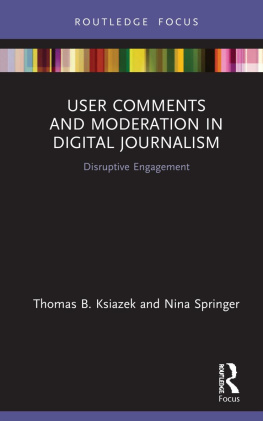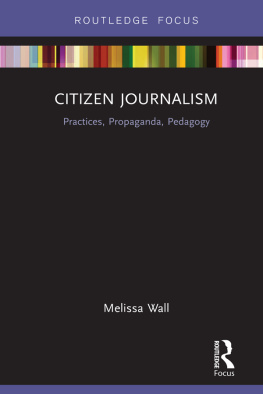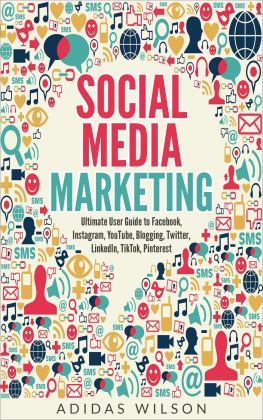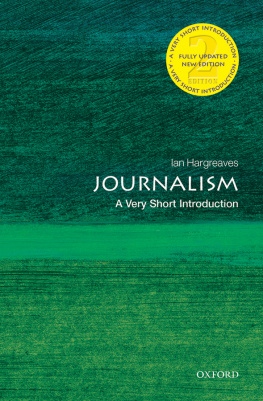User Comments and Moderation in Digital Journalism
This book is an authoritative discussion of user comments and moderation in digital journalism, examining how user comments have disrupted the field of journalism and how a growing number of news organizations have abandoned commenting features altogether.
Making a broad argument concerning user commentary as a manifestation of user engagement and public deliberation, User Comments and Moderation in Digital Journalism: Disruptive Engagement conceptualizes the act of commenting as interactive engagement and participation in a virtual public sphere. The book also explores the organizational policies that have the potential to disrupt as well as improve the quality of user discussions. Ultimately, strategies are proposed for managing and improving user comments and encouraging more productive public deliberation in digital journalism.
This engaging discussion of a key development in digital journalism is a valuable resource for academics and researchers in the areas of journalism, media and communication studies.
Thomas B. Ksiazek holds a PhD from Northwestern University, USA, and is an associate professor in the Department of Communication at Villanova University, USA. His research interests include new forms of user engagement with the news, implications of audience behavior for society and the field of journalism, patterns of cross-platform media use, and the application of network analysis to the consumption and production of media.
Nina Springer (Dr. phil., LMU Munich, Germany) is an associate professor in the Journalism Department at Sdertrn University, Stockholm, Sweden. Her research focuses on journalists-audience-interactions and the journalistic profession. In the realm of commentary features, she investigated commenters motives and contributions to viewpoint diversity, as well as comments use for and their effects on audiences and journalists alike.
Disruptions: Studies in Digital Journalism
Series editor: Bob Franklin
Disruptions refers to the radical changes provoked by the affordances of digital technologies that occur at a pace and on a scale that disrupts settled understandings and traditional ways of creating value, interacting and communicating both socially and professionally. The consequences for digital journalism involve far reaching changes to business models, professional practices, roles, ethics, products and even challenges to the accepted definitions and understandings of journalism. For Digital Journalism Studies, the field of academic inquiry which explores and examines digital journalism, disruption results in paradigmatic and tectonic shifts in scholarly concerns. It prompts reconsideration of research methods, theoretical analyses and responses (oppositional and consensual) to such changes, which have been described as being akin to a moment of mind-blowing uncertainty.
Routledges new book series, Disruptions: Studies in Digital Journalism, seeks to capture, examine and analyse these moments of exciting and explosive professional and scholarly innovation which characterize developments in the day-to-day practice of journalism in an age of digital media, and which are articulated in the newly emerging academic discipline of Digital Journalism Studies.
Hacking Gender and Technology in Journalism
Sara De Vuyst
New Media Unions
Nicole Cohen and Greig De Peuter
User Comments and Moderation in Digital Journalism
Thomas B. Ksiazek and Nina Springer
For more information, please visit: www.routledge.com/Disruptions/book-series/DISRUPTDIGJOUR
First published 2020
by Routledge
2 Park Square, Milton Park, Abingdon, Oxon, OX14 4RN
and by Routledge
52 Vanderbilt Avenue, New York, NY 10017
Routledge is an imprint of the Taylor & Francis Group, an informa business
2020 Taylor & Francis
The right of Thomas B. Ksiazek and Nina Springer to be identified as authors of this work has been asserted by them in accordance with sections 77 and 78 of the Copyright, Designs and Patents Act 1988.
All rights reserved. No part of this book may be reprinted or reproduced or utilised in any form or by any electronic, mechanical, or other means, now known or hereafter invented, including photocopying and recording, or in any information storage or retrieval system, without permission in writing from the publishers.
Trademark notice: Product or corporate names may be trademarks or registered trademarks, and are used only for identification and explanation without intent to infringe.
Library of Congress Cataloging-in-Publication Data
A catalog record for this title has been requested
ISBN: 978-0-367-22642-8 (hbk)
ISBN: 978-0-429-27613-2 (ebk)
Typeset in Times New Roman
by codeMantra
Thomas B. Ksiazek
To my wife, Melinda, for her unwavering and loving support. To her and our two young children, Ty and Cora, for giving me the peace of mind and motivationand sleepI needed to write this book.
Nina Springer
To Eli. Achim, Annie, and Heidideeply grateful for all your support.
Thomas B. Ksiazek
To countless colleagues and students, both past and present. This work dates back a decade, to my time as a PhD student at Northwestern University. While embarking on a large-scale content analysis of YouTube news videos, my colleague Limor Peer suggested, Why dont we capture these comments posted below the videos? There could be some interesting research opportunities there. And so, it began.
Limor and I published several studies and book chapters together, exploring user comments posted to YouTube news videos, some of which were co-authored with Kevin Lessard and Andrew Zivic, both graduate students at Villanova University. This laid the groundwork for the empirical research that serves as the foundation for much of this book. That work has been generously supported over the years by the Waterhouse Family Institute for the Study of Communication and Society at Villanova as well as multiple University Summer Grants and Summer Research Fellowships from Villanova. This research would also not have been possible without the tireless support of my dedicated undergraduate (Caroline Hroncich, Nicole Villegas) and graduate (Maria Nelson, Sri Varsha Devineni) research assistants.
Finally, Id be remiss if I didnt acknowledge my co-author, Nina Springer. Ive had the great honor of collaborating with such a smart and thoughtful colleague these past few years. Its been a true pleasure writing this book together.
Nina Springer
My academic career started with an interest in why people comment on news, and I feel I still havent answered this conclusively for myself. However, I guess the journey is the reward, and I am grateful that many students and colleagues were part of this journey, enriching it incredibly. I was blessed to have great guidance and input along the way from the professors I worked with: Thomas Hanitzsch, Michael Meyen, Heinz Prer, and Jens Wolling. Further, a lot of wonderfully curious and inquiring students found interest in the topic. I am grateful for all their smart thoughts and input. Here, a special thank you for the most awesome support goes out to Dunja Hoyh, Lisa Hemmerich, Moritz Baumstieger, Anna Sophie Kmpel, Ramona Ludolph, and Christian Pfaffingerwho contributed greatly in different contexts to my dissertation work. LMU Munich offers important financial resources for young female scholars, and I am thankful that I could tap into these throughout my PhD and Postdoc years. LMUs Department of Media and Communication also hosts some of the smartest and most inspiring people on earth. I had the honor to explore user comments not only with all the bright persons mentioned before but also with my incredible colleagues back then: Christian Baden, Ines Engelmann, Mario Haim (who also gave the chapter on machine learning in comment moderation a second look), and Benjamin Krmer. Furthermore, I was greatly inspired by collaborations with some of the most fantastic scholars: Gina Masullo Chen, Pablo Jost, Scott Wright, and Marc Ziegele. Finally, deep gratitude goes out to Tom B. Ksiazek. Not only did he invite me to depart on this endeavorhe also made me stand at the top of a skyscraper in Philadelphia. I must say, the feelings of submitting a book manuscript and surviving eye-to-eye contact with William Penn in Philadelphias heavens are quite comparable. Journeys with Tom are inspiring, enriching, and wonderfully specialhis clarity in thinking is legendary. What a pleasure to collaborate with such a great scholar and person.





